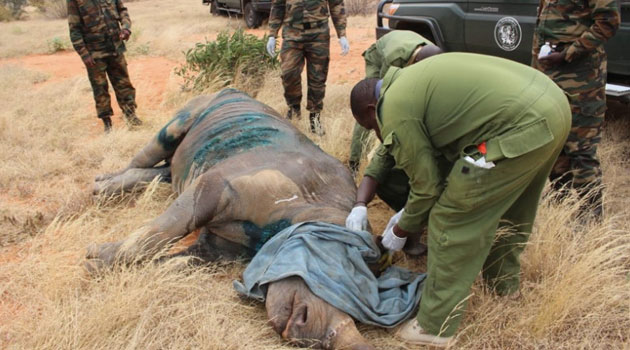
The animal’s condition worsened Saturday with Kenya Wildlife Service (KWS) veterinary officers swinging into action to treat wounds inflicted on it late last month when a pride of lions attacked it/COURTESY
NAIROBI, Kenya, Aug 6 – The last surviving black rhino of the 11 translocated to the Tsavo East National Park in June has died, conservationists confirmed Monday
The animal’s condition worsened Saturday with Kenya Wildlife Service (KWS) veterinary officers swinging into action to treat wounds inflicted on it late last month when a pride of lions attacked it.
The death has exposed negligence of proportional magnitude on the part of the KWS with a probe into the ten previous deaths released on July 26 pointing professional negligence.
A probe team reported that the rhinos had suffered Multiple Stress Syndrome fuelled by the uptake of saline water at the Tsavo, which triggered acute dehydration leading to their deaths.
The inquest also reported “starvation, proliferation of opportunistic bacteria in upper respiratory tract (Pasteurella species), gastric ulcers and gastritis” as triggers of the deaths.
“The independent inquiry shows that there were areas of clear negligence that occurred at the Tsavo which include poor conditioning, poor coordination, and poor communication by KWS staff at the Tsavo,” Tourism and Wildlife Cabinet Secretary Najib Balala disclosed when he unveiled the report.
Following the presentation of the report by a six-member inquiry team led by Benson Omondi, an officer from the Directorate of Criminal Investigations, Balala suspended six KWS officers over negligence.
Among those suspended was the service’s Deputy Director in-charge of Biodiversity, Research and Monitoring, Samuel Kasiki, who according to a report tabled by the six-member probe team failed to coordinate research-line departments at the KWS leading to poor decision-making ahead of the translocation.
“He did not coordinate line departments and provide best advice on best science on the management of the translocation exercise failed to play his role as expected,” Balala announced.
Balala said the KWS officers failed to take appropriate action despite a finding in February that two boreholes sank at the holding area where the rhinos were to be relocated in June had high salinity.
The two boreholes drilled by Davis and Shirtliff with the funding of World Wide Fund for Nature had salinity levels of 26,200 and 5,600 parts-per million respectively, the investigation team reported.
A nearby spring had a salinity level of 6,500 parts-per million, the investigation showed.
The drilling company was reported to have advised the park management to undertake continuous pumping so as to monitor the salinity levels in the two boreholes ahead of the relocation of the rhinos – eight from the Nairobi National Park and six from the Nakuru National Park – advice KWS officers managing the translocation overlooked.
“The independent inquiry shows that there were areas of clear negligence that occurred at the Tsavo which include poor conditioning, poor coordination, and poor communication by KWS staff at the Tsavo,” Balala said.
Others suspended pending disciplinary action were Francis Gakuya, the Head of Veterinary and Capture Services, Isaac Leekolol, Head of Capture Services, Felix Mwangangi the Senior Warden Tsavo East National Park, Mohammed Omar, Head of Ecological Monitoring, and Fredrick Odock Lala, Senior Scientist at the Tsavo East National Park.
The Ministry of Tourism and Wildlife has dismissed claims by former KWS’ board Chairperson Richard Leakey who on July 27 said the panel had advised against the relocation of the rhinos.
Leakey whose three-year term ended on April 17 said the absence of a substantive board was derailing the wildlife agency.









































